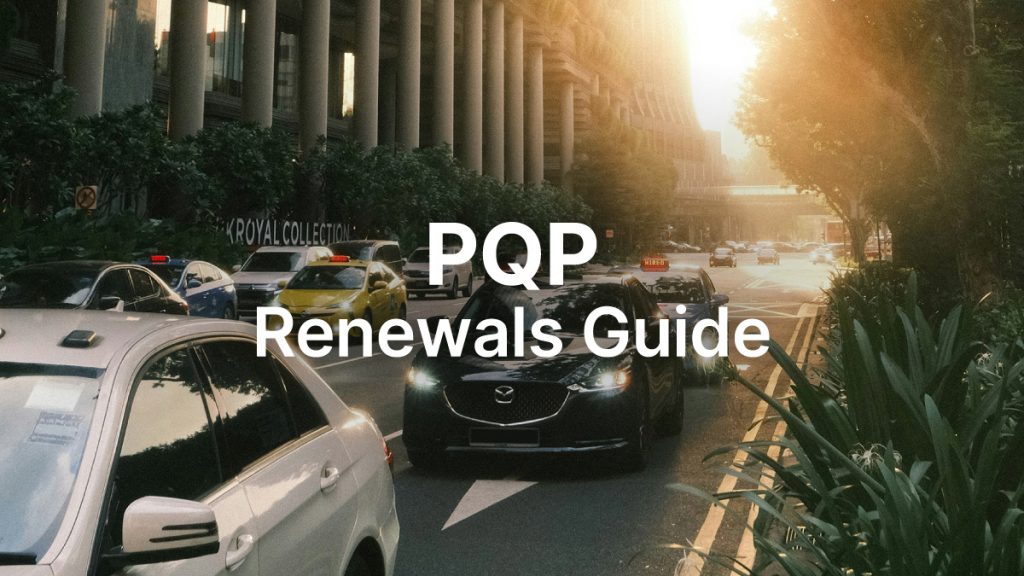Owning a car in Singapore is not just about paying for the vehicle itself. One of the most important costs is the Certificate of Entitlement (COE). After 10 years, when your COE expires, you face a critical decision: deregister the car, buy a new one, or renew the COE by paying the Prevailing Quota Premium (PQP). For many car owners, particularly those in Category A (smaller cars) and Category B (larger cars), renewing through PQP can be the smarter choice.
However, PQP rules are not always easy to understand. This article provides a comprehensive guide to PQP renewals in Singapore, covering how it works, what it costs, and how to make the best financial decision.
Table of Contents
What is PQP and Why It Matters
The PQP, or Prevailing Quota Premium, is the price you pay to renew your car’s COE without going through the open bidding exercise again. It is calculated as the moving average of the last three months’ COE premiums in your car’s category. This method smooths out sudden spikes or drops in COE prices, but it also means that your renewal cost will follow the overall market trend.
If COE prices have been rising, the PQP will rise too, and vice versa. For most owners, PQP is still cheaper than bidding for a brand-new COE. It matters because it directly affects whether it is financially viable to keep your existing car or replace it.
COE Categories and How They Affect PQP
When renewing, the amount you pay depends on your COE category. Category A covers cars up to 1,600cc and 97kW (or small EVs up to 110kW), while Category B covers larger and more powerful cars. Category C is for goods vehicles and buses, and Category D is for motorcycles.
Categories A and B are the most relevant to most Singapore car owners, and their PQP levels tend to be the highest due to demand. Generally, renewing a Category A car costs less than renewing a Category B vehicle.
How PQP is Calculated
PQP is based on a three-month average. For example, if the Category A COE premiums for June, July, and August were $100,000, $105,000, and $95,000 respectively, the PQP for September would be $100,000. This figure is published at the start of each month by LTA, and owners can also track it using PQP calculators.
PQP Renewals Options: 5-Year vs 10-Year
Car owners have two options when renewing their COE. A 5-year renewal costs 50% of the PQP, but once chosen, the car must be deregistered after 15 years. This option is useful if you only need the car for a few more years.
A 10-year renewal requires paying the full PQP but allows unlimited further renewals in future decades. This option is best for those who plan to keep their car long-term.
Step-by-Step Renewal Process
- Check your COE expiry date on your log card or the LTA portal.
- Look up the latest PQP for your category.
- Decide whether to renew for 5 or 10 years.
- Arrange financing through a bank loan, in-house loan, or cash.
- Submit the renewal application online at OneMotoring.
- Receive digital confirmation of your new COE term.
Cost-Saving Strategies
Smart timing can save thousands of dollars. If PQP is expected to rise, renewing early helps you lock in a lower rate. If PQP is falling, waiting until the next cycle could reduce costs, though you risk losing days of your existing COE term.
Other strategies include comparing loan packages to secure lower interest rates, avoiding late fees, and using calculators to forecast long-term costs. Importantly, consider whether the renewal makes sense compared to scrapping the car. Renewing forfeits your PARF rebate permanently, so weigh that against your car’s condition and market value.
Mistakes to Avoid
Many owners make costly mistakes. Missing the deadline can result in deregistration if you are more than a month late. Others fail to account for the loss of PARF rebate, which may make scrapping more cost-effective in some cases. Some assume renewal is always cheaper than buying a used car, which is not always true in a low-COE environment.
Conclusion
Renewing your COE through PQP is often a practical choice in Singapore’s high-cost car market. With proper planning, careful timing, and the use of online tools, you can make a financially sound decision that fits your needs. For updated PQP rates and calculators, CoePrice.sg is a useful resource for car owners.
FAQs on PQP Renewal
Can I renew for 3 years?
No, only 5-year or 10-year renewals are allowed.
Do I lose my PARF rebate if I renew?
Yes, once renewed, you cannot claim any PARF rebate.
Can I sell my car after renewal?
Yes, but buyers will only inherit the remaining COE rebate.

